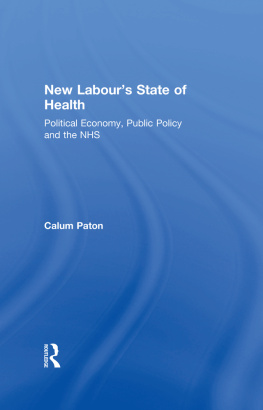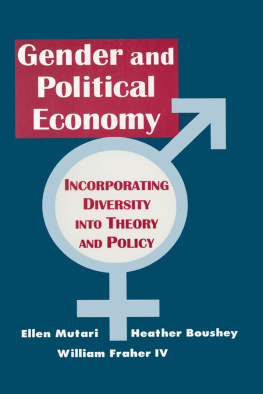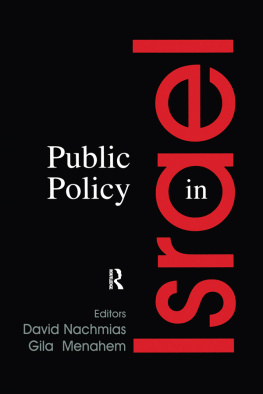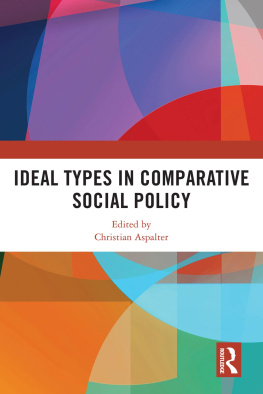NEW LABOUR'S STATE OF HEALTH
For Leah, Josh and Tracey
New Labours State of Health
Political Economy, Public Policy and the NHS
Calum Paton
Keele University, UK
First published 2006 by Ashgate Publishing
Published 2016 by Routledge
2 Park Square, Milton Park, Abingdon, Oxon OX14 4RN
711 Third Avenue, New York, NY 10017, USA
Routledge is an imprint of the Taylor & Francis Group, an informa business
Copyright 2006 Calum Paton
Calum Paton has asserted his moral right under the Copyright, Designs and Patents Act, 1988, to be identified as the author of this work.
All rights reserved. No part of this book may be reprinted or reproduced or utilised in any form or by any electronic, mechanical, or other means, now known or hereafter invented, including photocopying and recording, or in any information storage or retrieval system, without permission in writing from the publishers.
Notice:
Product or corporate names may be trademarks or registered trademarks, and are used only for identification and explanation without intent to infringe.
British Library Cataloguing in Publication Data
Paton, Calum R., 1956
New Labours state of health : political economy, public
policy and the NHS
1. Medical policy - Great Britain 2. National health
services - Great Britain 3. Public health - Great Britain
4. Medical economies - Great Britain
I. Title
362.10941
Library of Congress Cataloging-in-Publication Data
Paton, Calum, 1956
New labours state of health : political economy, public policy and the NHS / by
Calum Paton.
p. cm.
Includes index. ISBN-13: 978-0-7546-4513-9
ISBN-10: 0 7546-4513-4
1. Medical policy--Great Britain. 2. National health services--Great Britain. 3.
Public health--Great Britian. 4. Medical economics--Great Britian. I. Title.
RA395.G7P37 2006
362.10941--dc22
2006020643
ISBN 9780754645139 (hbk)
This book has grown from theoretical work on political economy and health services, which I began to commit to paper three years ago, into a synthesis of political economy, public policy and New Labour's record, particularly as regards the NHS. As a political scientist, I construe 'New Labour's record' in terms of the political legitimacy and sustainability of its reforms and initiatives rather than (just) 'technical evaluation' of its various fragments of policy.
As well as being both a political theorist and specialist in health policy, I have recently been Chairman of one of the UK's largest NHS hospital Trusts, for five years up to the end of 2005 after being reappointed in 2004. The book has not therefore come out with indecent haste after my scribblings of 2003. That said, I think I have been motivated to complete it quickly in 2006 with my academic concerns augmented by a desire more acute than usual to treat the worlds of theory and practice together!
I was often asked how I combined being a critical theorist and commentator with (what others construed, rightly or wrongly as) the role of an apparatchik. I tended to defuse the question by quoting the late Lord Hailsham, who when asked how he combined being both judge and legislator/member of the executive said, 'I'm sober as a judge but drunk as a Lord'!
More seriously, there's much to be sober about in today's NHS, the concept of which I endorse as fully as ever despite the culture which is being encouraged or allowed by politicians in England especially. At the theoretical level, the challenges of understanding how international political economy meets the 'domestic policy garbage can' to produce today's NHS are equally sobering.
I would like to thank anonymously many executives and staff I have met and worked with in the NHS, and who have (usually unconsciously) sharpened my understanding of how policy is implemented 'on the ground,' some of whom keep going in adverse conditions for altruistic reasons. And as ever I would like to thank those in academe who have challenged me in terms of my thesis.
Finally, my family as ever has contributed indirectly but constantly to this work. Combining theory with practice was (often) exhilarating as the most tedious detail of policy in practice suddenly throws light on some theory supposedly worlds apart; or as a piece of grand theory suddenly lights up what seemed to be a confusing mess in practice. But it could also be frustrating. As ever, I'd like to thank Tracey for putting up with me when I became Victor Meldrew rather than Karl Marx, and to my children Leah and Josh who always cheered me up by showing me that both academe and the NHS should be put and kept in their place! Enoch Powell once said that his proudest achievement in life was winning a donkey derby. Seeing my daughter and son playing together in their 'first school' football team means more to me than getting to the bottom of New Labour's neuroses!
I would like to thank the Journal of Health Economics, Policy and Law (Cambridge University Press) for agreeing that text prepared for my article entitled, 'Choice in the English NHS: Visible Hand or Invisible Fist?' (to be published in early 2007), could be adapted and incorporated in of this book.
Introduction: Political Economy, Public
Policy and New Labour
This book explains the influence of political economy upon public policy. It also illustrates, in theory and practice, how political economy interacts with other significant factors which help to explain public policy. It does this by examining health policy made and implemented by New Labour. It examines health policy under New Labour in its own right, but also in order to trace some general features both of New Labour's approach to government and of the policy process in modern Britain (especially England, in that much of the empirical material in in particular is drawn, post-devolution, from England rather than the other parts of the UK).
Health policy has some special characteristics, based on New Labour's diagnosis of the NHS's problems both pre-and post-1997, but it also exemplifies in important respects the general approach to domestic policy of New Labour. This is not surprising. Just as the Conservative health reforms of the 1990s drew on approaches which were generic to the public sector as a whole,New Labour's public sector agenda contains themes applied to health but by no means unique to health. In a nutshell, general politics in health is more significant than the specific politics of health, although the public sector 'reform agenda' hs had some pretty counter-intuitive and perverse effects when applied to health.
The title of the book deliberately has a triple reference. In reverse order: firstly, there is health (explored in detail in uses strategy for health services to illustrate how the New Labour stance on political economy is the driver of the 'New Labour project'.
Political Economy
The subtitle points to my diagnosis of political economy as a major determining factor in explaining health policy. In Britain) may differ from that in other countries. At the most general level, some questions must be asked, in order to set British or specifically English policy in context.
The most basic difference between countries is whether or not the private sector or public sector predominates in (especially) financing but also providing healthcare. If (as I have argued elsewhere (Paton, 2001)) capitalism benefits from an active role of the state in public healthcare as with the British National Health Service (NHS) despite the orthodox or nave view that the 'capitalist state' is the minimalist state, then why does the U.S. state not conform to this pattern? The answer is two-fold.










